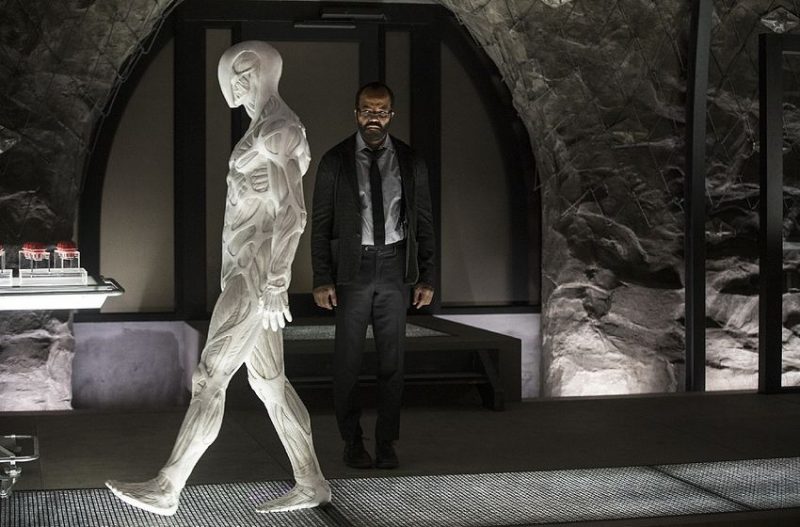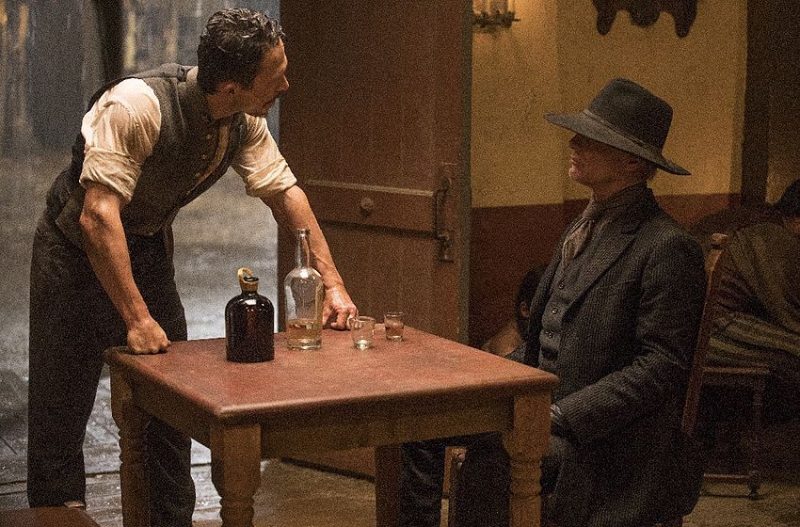Westworld – The Riddle of the Sphinx
Westworld's most interesting characters got a week off with "The Riddle of the Sphinx," which swung the focus back to William's life story (and continuing adventures on Ford's boring quest). While I'm normally one to complain about time spent with William (who, despite some baby steps towards characterization in "The Riddle of the Sphinx," continues to be a cipher of a character long after the series should have worked to flesh him out), using William and James Delos to introduce us to how the host tech could be used in interesting (and possibly amoral) ways was a stroke of genius.
As we saw previously, William and Jim don't really get along- Jim clearly wanted someone better for his daughter and he didn't want to have to give up his empire to a son-in-law he saw as inferior. Yet, both things came to pass and Jim was struck down by disease (presumably some form of lung cancer, thanks to all that coughing). So, how is an ageless Jim Delos chatting with an old William? Host tech, of course. Westworld and its sister parks are filled with incredible robots who have complex neural networks that seamlessly mimic human beings. Why couldn't Delos take that tech and layer an actual person's personality and memories across it, creating a way for humans to live forever? If you thought rampaging robots was a complicated conceit, actual human consciousness and memories housed in a robot shell is even more terrifying. Considering
Westworld already has a ton on its plate this season, what with the host revolution and William's game, I'm not sure this particular idea will get more play in the immediate future, but man, I would love to watch that particular arc play out somewhere.

Outside of the flashback, William's arc continues along at a snail's pace. I'm sure there are viewers out there who have deduced what "Glory" will be and how this game fits into the season arc (at least one hopes it ties up at least a bit nicely), but I continue not to care all that much about this quest. It remains far more interesting to watch the different host factions struggle with their new-found independence (this week's creepiest option: the Chinese railway workers who nailed humans and hosts to the ground as track for their now-West facing train line) than to see William try to solve Ford's final game (considering William and Ford are two of my least favorite characters, this isn't all that surprising to me).
We also got to spend a bit of time with Bernard and Elsie (who I had forgotten about until I saw Shannon Woodward's name in the opening credits), which didn't really advance his arc all that much, outside of letting Elsie in on Bernard's big dark secret- and letting us in on Bernard's fugue state murder of all those Delos techs. Bernard also got another hit of brain fluid, so he can keep on ticking for the foreseeable future (which is nice reliance on continuity, but a drag in an already drag-y episode).
All-in-all, "The Riddle of the Sphinx" wasn't one of
Westworld's finest hours, but it did introduce a new and crazy concept that hopefully pays dividends down the line (perhaps in relation to that information Charlotte is trying to smuggle off the island?).
 Final Thoughts:
Final Thoughts:
-- As many on the internet guessed, Grace is indeed William's estranged daughter. She's certainly an interesting character (a daughter who claims to hate her father, yet has adopted all his own bad habits in regard to getting taken in by the magic of Westworld), and having someone William actually cares about potentially in harm's way (or perhaps challenging him in the game) could make William's arc a bit more lively. No one so far has been able to push William's buttons or challenge his knowledge. I'd like to see what happens when he's not the alpha in the game.
-- Clementine has yet to utter a line this season. Not sure what that means, but I wanted to point that out.
Pros
- The idea of keeping the consciousness of a dead person in a host is really creepy and cool
- Emily might shake things up
Cons
- William's quest remains disappointing
 Outside of the flashback, William's arc continues along at a snail's pace. I'm sure there are viewers out there who have deduced what "Glory" will be and how this game fits into the season arc (at least one hopes it ties up at least a bit nicely), but I continue not to care all that much about this quest. It remains far more interesting to watch the different host factions struggle with their new-found independence (this week's creepiest option: the Chinese railway workers who nailed humans and hosts to the ground as track for their now-West facing train line) than to see William try to solve Ford's final game (considering William and Ford are two of my least favorite characters, this isn't all that surprising to me).
We also got to spend a bit of time with Bernard and Elsie (who I had forgotten about until I saw Shannon Woodward's name in the opening credits), which didn't really advance his arc all that much, outside of letting Elsie in on Bernard's big dark secret- and letting us in on Bernard's fugue state murder of all those Delos techs. Bernard also got another hit of brain fluid, so he can keep on ticking for the foreseeable future (which is nice reliance on continuity, but a drag in an already drag-y episode).
All-in-all, "The Riddle of the Sphinx" wasn't one of Westworld's finest hours, but it did introduce a new and crazy concept that hopefully pays dividends down the line (perhaps in relation to that information Charlotte is trying to smuggle off the island?).
Outside of the flashback, William's arc continues along at a snail's pace. I'm sure there are viewers out there who have deduced what "Glory" will be and how this game fits into the season arc (at least one hopes it ties up at least a bit nicely), but I continue not to care all that much about this quest. It remains far more interesting to watch the different host factions struggle with their new-found independence (this week's creepiest option: the Chinese railway workers who nailed humans and hosts to the ground as track for their now-West facing train line) than to see William try to solve Ford's final game (considering William and Ford are two of my least favorite characters, this isn't all that surprising to me).
We also got to spend a bit of time with Bernard and Elsie (who I had forgotten about until I saw Shannon Woodward's name in the opening credits), which didn't really advance his arc all that much, outside of letting Elsie in on Bernard's big dark secret- and letting us in on Bernard's fugue state murder of all those Delos techs. Bernard also got another hit of brain fluid, so he can keep on ticking for the foreseeable future (which is nice reliance on continuity, but a drag in an already drag-y episode).
All-in-all, "The Riddle of the Sphinx" wasn't one of Westworld's finest hours, but it did introduce a new and crazy concept that hopefully pays dividends down the line (perhaps in relation to that information Charlotte is trying to smuggle off the island?).
 Final Thoughts:
-- As many on the internet guessed, Grace is indeed William's estranged daughter. She's certainly an interesting character (a daughter who claims to hate her father, yet has adopted all his own bad habits in regard to getting taken in by the magic of Westworld), and having someone William actually cares about potentially in harm's way (or perhaps challenging him in the game) could make William's arc a bit more lively. No one so far has been able to push William's buttons or challenge his knowledge. I'd like to see what happens when he's not the alpha in the game.
-- Clementine has yet to utter a line this season. Not sure what that means, but I wanted to point that out.
Final Thoughts:
-- As many on the internet guessed, Grace is indeed William's estranged daughter. She's certainly an interesting character (a daughter who claims to hate her father, yet has adopted all his own bad habits in regard to getting taken in by the magic of Westworld), and having someone William actually cares about potentially in harm's way (or perhaps challenging him in the game) could make William's arc a bit more lively. No one so far has been able to push William's buttons or challenge his knowledge. I'd like to see what happens when he's not the alpha in the game.
-- Clementine has yet to utter a line this season. Not sure what that means, but I wanted to point that out.